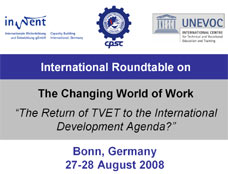
The UNESCO-UNEVOC International Centre: Who We Are | What We Do | Working With Us | Get in Touch
The UNEVOC Network: Learn About the Network | UNEVOC Network Directory
For Members: UNEVOC Centre Dashboard
Thematic Areas: Inclusion and Youth | Digital Transformation | Private Sector Engagement | SDGs and Greening TVET
Our Key Programmes & Projects: BILT: Bridging Innovation and Learning in TVET | Building TVET resilience | TVET Leadership Programme | WYSD: World Youth Skills Day
Past Activities: COVID-19 response | i-hubs project | TVET Global Forums | Virtual Conferences | YEM Knowledge Portal
Our Services & Resources: Publications | TVET Forum | TVET Country Profiles | TVETipedia Glossary | Innovative and Promising Practices | Toolkits for TVET Providers | Entrepreneurial Learning Guide
Events: Major TVET Events | UNEVOC Network News
The Return of TVET to the International Development Agenda?
 In a two day event, on the 27th and 28th of August, 2008, an International Roundtable on the Changing World of Work: The Return of TVET to the International Development Agenda? was convened in Bonn, Germany. The Roundtable, hosted and organized by InWEnt Capacity Building International
In a two day event, on the 27th and 28th of August, 2008, an International Roundtable on the Changing World of Work: The Return of TVET to the International Development Agenda? was convened in Bonn, Germany. The Roundtable, hosted and organized by InWEnt Capacity Building International![]() , Bonn; in partnership with UNESCO-UNEVOC International Centre, Bonn; and the Colombo Plan Staff College
, Bonn; in partnership with UNESCO-UNEVOC International Centre, Bonn; and the Colombo Plan Staff College![]() (CPSC), Manila, brought together 57 country representatives, policy makers and TVET experts in the field in order to exchange views on the key issues and challenges linked to the existing and future changes in the world of work and its consequences for TVET systems in responding to these changes.
(CPSC), Manila, brought together 57 country representatives, policy makers and TVET experts in the field in order to exchange views on the key issues and challenges linked to the existing and future changes in the world of work and its consequences for TVET systems in responding to these changes.
The UNESCO-UNEVOC International Centre is the UNESCO body responsible for supporting education, training and capacity building for sustainable development in relation to the world of work. In October 2004, an International Experts meeting on “Learning for Work, Citizenship and Sustainability” was held in Bonn at which the Bonn Declaration![]() was adopted and declared “technical and vocational education and training (TVET) must be the master key that can alleviate poverty, promote peace, conserve the environment, improve the quality of life for all and help achieve sustainable development.” In a number of follow-up meetings in Thailand (2005), Bahrain (2005), and Vietnam (2006); the responsibilities of national systems for Technical and Vocational Education and Training in advancing sustainable development through workforce development were discussed.
was adopted and declared “technical and vocational education and training (TVET) must be the master key that can alleviate poverty, promote peace, conserve the environment, improve the quality of life for all and help achieve sustainable development.” In a number of follow-up meetings in Thailand (2005), Bahrain (2005), and Vietnam (2006); the responsibilities of national systems for Technical and Vocational Education and Training in advancing sustainable development through workforce development were discussed.
In parallel efforts across regions, other discussions relevant to TVET and its role in sustainable development and poverty alleviation have taken place, including a CPSC organized symposium in January 2008, in collaboration with UNESCO-UNEVOC International Centre, on “Skills Development for Poverty Alleviation.” The symposium, attended by 120 delegates from 21 countries resulted in the Manila Declaration![]() .
.
The driving changes in the world of work: globalization, the knowledge economy and rapid advance in ICTs have had major implications for skills demand and training. It is thus a timely initiative to re-examine important matters relating to the changing world of work.
This roundtable, which explored the extent to which the “Return of TVET” is occurring, how TVET is integrated in national development strategies, and the recent reforms in TVET and the challenges ahead; also provided an opportunity for informal exchanges of views in exploring critical issues countries face in promoting TVET.
Download
Background, Programme Booklet, List of Participants (pdf, 600KB)